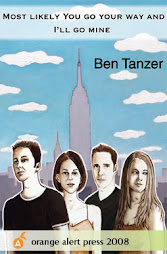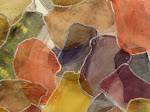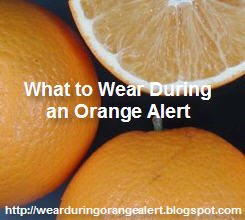
Cecilia Ferreira

OA: How would you describe your work?
CF: My work is subconscious vomit. I swallow life and regurgitate it and puke it out on paper.
It's a product of experimentation and it happens by chance. I often splatter paint over a surface and wait for the canvas to tell me what to paint. I like to make a clear differentiation between my work and I, because I believe it is not me as a brain, or me as a heart, or me as a person, who is in fact creating the images. I consider myself a channel or a used vessel communicating messages much greater than what I would normally have to say. Sometimes I create something and when it's finished I wonder how the image actually got there, since I didn't even put a second's thought into it. But as much as I would like to believe I am in no way connected to my art, I have to admit that that statement cannot possibly be a hundred percent true.
I never take more than a few minutes to create an image. I consider immediacy imperative for the unadulterated depiction of my subject. I always try to directly confront the viewer and make him or her uncomfortable. Real realization never happens comfortably.
OA: Several of your images speak out (loudly) against violence towards women. Why have you chosen this as a topic of focus?
CF: My art deals with a lot of issues.
If it deals with this one in particular, I suppose it has a lot to do with the fact that I'm a woman. I never considered myself a feminist. Pure Electra, I always had a very special relationship with my father, always got along better with males, etc. When I was much younger, my admiration for the male specie convinced me that men are in fact superior in many ways. I felt really comfortable believing that…until I had a child.
Since the birth, my views on the female gender changed drastically. The female gender's capacity to, physically and mentally, go through the gestational period, birth and thereafter motherhood, is absolutely unworldly. I now view females with admiration and I am in constant awe of the complexity of their bodies. I also admire the way females are constantly challenged by facing society's which are often unsympathetic towards women and which do not give them the recognition they deserve. Often women are victimized because they are either inferior in size, born into the wrong culture or just too damn stupid to realize how extraordinary they are.
I am not sure why I speak out against violence towards women. I suppose it comes across as me defending women, or maybe it can be because I'm so disappointed that even in today's day and age, women in certain cultures are reluctant to stand up for themselves. When I depict women as victims, I might even imply that they victimize themselves.
I grew up in South Africa, where women are raped by the minute. This type of violence towards women are sickening for the obvious reasons. Often there are "suaver" types of violence towards women. Viewing women as mere sexual objects, slaves who belong in the kitchen or as the weaker sex based on their size is in one way or the other, violating the gender.

OA: In many of your pieces you scratch out a message directly into the piece. Is this like a form of visual poetry? Why wouldn't the image speak for itself?
CF: My latest series, where I wrote phrases directly onto the image, is called "Issues".
I bought a high gloss fashion magazine one day and instead of neatly putting it on a shelf, I had this great urge to rip it apart and ragefully manipulate the pages into images that might be the exact opposite of what it was meant to be. All of the perfect models became ugly and I used the images of women in the magazine to portray outcasts, psychosis, eating disorders, sadness and all kinds of issues "real life" and "normal" women deal with. I specifically wrote the phrases on the pages to give it a subjective feel. All or most of the sentences are written in the first person, to draw the viewer close, as if the viewer is directly confronted with a person. Many viewers make the terrible mistake to assume that, because the phrases are written in the first person, all the issues are directly related to me as a person! The manner in which I have written the words are scratched, frantic or desperate to make the message hard, clear and "in your face". I don't believe these images speak for themselves, or at least loudly enough, without the text.
OA: You recently started writing poetry. In what way is poetry a different outlet for your creativity?
CF: I once described poetry and fine art as lovers: they are separate entities but they constantly wear each other's scent. No doubt the two are related, but for me, as a creative person, the two are worlds apart.
Visual art, for me, comes instinctively, naturally. I don't need to think about it, it just rocks up and I immediately release it. I describe it as vomit, because it really is a major release, afterwards I feel relieved and light, as if some poison inside me just had to come out.

Bonus Questions:
OA: What is the coffee like in Africa? Have you ever had coffee from another country?
CF: The coffee in Africa is what we call "filter coffee". I think it's pretty much the same as in America. We drink our coffee with milk, mostly. The fad is flavoured coffee that tastes like everything but coffee. When I lived in Portugal, I was fascinated by the short little pitch black espresso's the Portuguese people used to throw down their throats numerous times a day. There's no savouring the coffee, no sipping it slowly, just gulping it down for the caffeine buzz, I suppose.
OA: What type of music do you enjoy? Who are a few of your favorites?
CF: My mom is a music teacher, so I was pretty much bombarded with Maria Callas and dramatic classical music as a child (hey, maybe that explains everything!) Then I grew up and was bombarded by my brother's music, Rammstein, Metallica etc. I love all kinds of music. I'm not exposed to music like I would like to be. I have been introduced to Lydia Lunch (I love her Gloomy Sunday) and Coco Rosie. I love "old jazz" like Oscar Peterson. I am a big fan of French saxophonist Sophie Alour. I LOVE Placebo (I have never heard lyrics that do it for me like their's do), Rammstein (more for their music video's than for their music) and Portuguese Fado music like Marisa and Dulce Pontes. Brazilian jazz makes me happy. Afrikaans music like Chris Chameleon makes me nostalgic... But the list really goes on.
As a white American male sitting behind my laptop in my suburban townhouse, it is not easy for me to understand the plight of abused woman more or less the point of view of a woman living in South Africa. From what I have read, this violence or abuse is so ingrained in their culture that it is irreversible and occurs as second nature. So it is only natural that it bleeds into the work of the artists and musicians. When capturing such an emotional topic or event, is it to speak out, is it to fight against, or is it simply to document?
South African artist and writer Cecilia Ferreira tries to capture this powerful emotion, but does not limit her work to her surrounding. She works on all sorts of themes and on various subjects from abstract to photography to poetry. Her latest series focuses on altering pages from a fashion magazine. Regardless of the medium, her work always tries to help the cause of womanhood and entertain the viewer.
Recently, Cecilia was kind enough to answer a few of my questions.

OA: How would you describe your work?
CF: My work is subconscious vomit. I swallow life and regurgitate it and puke it out on paper.
It's a product of experimentation and it happens by chance. I often splatter paint over a surface and wait for the canvas to tell me what to paint. I like to make a clear differentiation between my work and I, because I believe it is not me as a brain, or me as a heart, or me as a person, who is in fact creating the images. I consider myself a channel or a used vessel communicating messages much greater than what I would normally have to say. Sometimes I create something and when it's finished I wonder how the image actually got there, since I didn't even put a second's thought into it. But as much as I would like to believe I am in no way connected to my art, I have to admit that that statement cannot possibly be a hundred percent true.
I never take more than a few minutes to create an image. I consider immediacy imperative for the unadulterated depiction of my subject. I always try to directly confront the viewer and make him or her uncomfortable. Real realization never happens comfortably.
OA: Several of your images speak out (loudly) against violence towards women. Why have you chosen this as a topic of focus?
CF: My art deals with a lot of issues.
If it deals with this one in particular, I suppose it has a lot to do with the fact that I'm a woman. I never considered myself a feminist. Pure Electra, I always had a very special relationship with my father, always got along better with males, etc. When I was much younger, my admiration for the male specie convinced me that men are in fact superior in many ways. I felt really comfortable believing that…until I had a child.
Since the birth, my views on the female gender changed drastically. The female gender's capacity to, physically and mentally, go through the gestational period, birth and thereafter motherhood, is absolutely unworldly. I now view females with admiration and I am in constant awe of the complexity of their bodies. I also admire the way females are constantly challenged by facing society's which are often unsympathetic towards women and which do not give them the recognition they deserve. Often women are victimized because they are either inferior in size, born into the wrong culture or just too damn stupid to realize how extraordinary they are.
I am not sure why I speak out against violence towards women. I suppose it comes across as me defending women, or maybe it can be because I'm so disappointed that even in today's day and age, women in certain cultures are reluctant to stand up for themselves. When I depict women as victims, I might even imply that they victimize themselves.
I grew up in South Africa, where women are raped by the minute. This type of violence towards women are sickening for the obvious reasons. Often there are "suaver" types of violence towards women. Viewing women as mere sexual objects, slaves who belong in the kitchen or as the weaker sex based on their size is in one way or the other, violating the gender.

OA: In many of your pieces you scratch out a message directly into the piece. Is this like a form of visual poetry? Why wouldn't the image speak for itself?
CF: My latest series, where I wrote phrases directly onto the image, is called "Issues".
I bought a high gloss fashion magazine one day and instead of neatly putting it on a shelf, I had this great urge to rip it apart and ragefully manipulate the pages into images that might be the exact opposite of what it was meant to be. All of the perfect models became ugly and I used the images of women in the magazine to portray outcasts, psychosis, eating disorders, sadness and all kinds of issues "real life" and "normal" women deal with. I specifically wrote the phrases on the pages to give it a subjective feel. All or most of the sentences are written in the first person, to draw the viewer close, as if the viewer is directly confronted with a person. Many viewers make the terrible mistake to assume that, because the phrases are written in the first person, all the issues are directly related to me as a person! The manner in which I have written the words are scratched, frantic or desperate to make the message hard, clear and "in your face". I don't believe these images speak for themselves, or at least loudly enough, without the text.
OA: You recently started writing poetry. In what way is poetry a different outlet for your creativity?
CF: I once described poetry and fine art as lovers: they are separate entities but they constantly wear each other's scent. No doubt the two are related, but for me, as a creative person, the two are worlds apart.
Visual art, for me, comes instinctively, naturally. I don't need to think about it, it just rocks up and I immediately release it. I describe it as vomit, because it really is a major release, afterwards I feel relieved and light, as if some poison inside me just had to come out.
Poetry, on the other hand, feels like a release onto me; not me releasing something. Poetry for me is a search, a hunt, a delving process where I dig up things in my mind that maybe shouldn't be disturbed. For me personally, poetry is a much bigger challenge, maybe because I am not as familiar with words as with colour and line. I also haven't yet mastered how to write with immediacy and spontaneity whilst using the correct grammar and vocab at the same time.
.I often say that, if I didn't do art, I would be psycho. Since I started writing poetry I feel that, if I keep writing poetry, I would surely become psycho!.
OA: I am fascinated by the fact that you are from Africa. In what way might your environment inform your art?
CF: To answer this one I can only speculate. I grew up in South Africa in a very unique culture, the Afrikaans culture. Our language is derived from Dutch, and yes, my culture is greatly connected to the Apartheid era. It wasn't easy growing up as an Afrikaans girl with very liberal views since a young age. I suppose as a susceptible teenager I was directly confronted with a lot of things in society that seemed inhumane. I can also speculate that, growing up as an Afrikaner has a lot to do with the loudness, the brutal "in your face" nature of my art. The Afrikaner culture in general is not what I would describe as" tactful" and "soft". Being an African in my heart maybe makes me create instinctively. African people often go by instinct; it's what nature teaches you.
.I often say that, if I didn't do art, I would be psycho. Since I started writing poetry I feel that, if I keep writing poetry, I would surely become psycho!.
OA: I am fascinated by the fact that you are from Africa. In what way might your environment inform your art?
CF: To answer this one I can only speculate. I grew up in South Africa in a very unique culture, the Afrikaans culture. Our language is derived from Dutch, and yes, my culture is greatly connected to the Apartheid era. It wasn't easy growing up as an Afrikaans girl with very liberal views since a young age. I suppose as a susceptible teenager I was directly confronted with a lot of things in society that seemed inhumane. I can also speculate that, growing up as an Afrikaner has a lot to do with the loudness, the brutal "in your face" nature of my art. The Afrikaner culture in general is not what I would describe as" tactful" and "soft". Being an African in my heart maybe makes me create instinctively. African people often go by instinct; it's what nature teaches you.
On the other hand, my art has been greatly influenced by living in Portugal for six years. I married a Portuguese and I was thrown into a completely new language, culture and country. Also, Western media has influence my art greatly, so I can't say that living in Africa is what makes my art. But I did grow up barefoot, not being afraid of nature, of greatness, of sensing...
don't know if that answers your question.
OA: What's next for Cecilia Ferreira?
CF: Man, I think it's about time I have my first solo!
don't know if that answers your question.
OA: What's next for Cecilia Ferreira?
CF: Man, I think it's about time I have my first solo!

Bonus Questions:
OA: What is the coffee like in Africa? Have you ever had coffee from another country?
CF: The coffee in Africa is what we call "filter coffee". I think it's pretty much the same as in America. We drink our coffee with milk, mostly. The fad is flavoured coffee that tastes like everything but coffee. When I lived in Portugal, I was fascinated by the short little pitch black espresso's the Portuguese people used to throw down their throats numerous times a day. There's no savouring the coffee, no sipping it slowly, just gulping it down for the caffeine buzz, I suppose.
OA: What type of music do you enjoy? Who are a few of your favorites?
CF: My mom is a music teacher, so I was pretty much bombarded with Maria Callas and dramatic classical music as a child (hey, maybe that explains everything!) Then I grew up and was bombarded by my brother's music, Rammstein, Metallica etc. I love all kinds of music. I'm not exposed to music like I would like to be. I have been introduced to Lydia Lunch (I love her Gloomy Sunday) and Coco Rosie. I love "old jazz" like Oscar Peterson. I am a big fan of French saxophonist Sophie Alour. I LOVE Placebo (I have never heard lyrics that do it for me like their's do), Rammstein (more for their music video's than for their music) and Portuguese Fado music like Marisa and Dulce Pontes. Brazilian jazz makes me happy. Afrikaans music like Chris Chameleon makes me nostalgic... But the list really goes on.
For more information on Cecilia Ferreira please visit her at Aryan Kaganof's blog.
+by+Nick+Volkert).jpg)

















1 comment:
Thank you for this post - I didn't know about Cecilia before, but am glad to have found this site via her. And her.
Awesome blog; got some reading to do.
Greetings from Cape Town
P.S. I drink mostly Italian espresso myself, but the majority drink instant coffee. Comes 'cheap' in a nice big tin.
Post a Comment